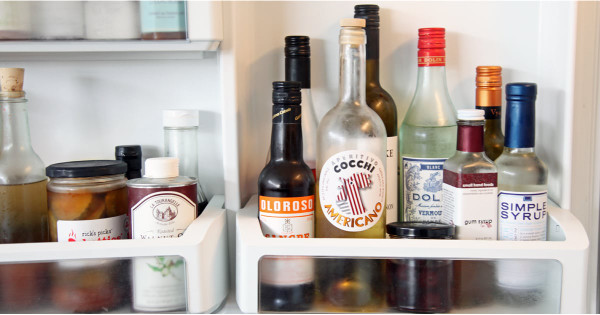Some alcohols, like pure spirits (whiskey, rum, gin, etc.), can be stored at room temperature and be perfectly safe. That is not the case will all alcoholic bottles. Many do need to be refrigerated to help keep the integrity and flavor of the liquid. So, how do we know what needs to be refrigerated? A good general rule to follow is this: if it is under 15% alcohol or if it has a wine base, it belongs in the fridge once it is opened. Let’s get into some specifics.
Vermouth: Vermouth is a fortified and infused wine that is often served as an aperitif or in a cocktail. Because it has a slightly higher alcohol content than wine, it won’t oxidize as quickly as wine, but it will still oxidize. So, it is best to keep open bottles of vermouth (any kind of vermouth) in the fridge once they are opened. Try not to keep your open vermouth in the fridge for too long though. The flavors in vermouth can still change in the fridge, even after one month. So if you aren’t having regular cocktail parties where you can get through a bottle frequently, maybe try purchasing half bottles, so you don’t waste any vermouth.
Fortified Wines: This category includes port, sherry, Madeira, and Marsala. The same rules of vermouth apply here, but can be extended a little bit. Because these wines usually have a higher alcohol content, they can be stored, open, in the fridge for a few months before the flavors warp. Sweeter varieties will last longer than dryer verieties.
Wine: While most people know to serve white wine chilled, many don’t realize that all wine varietals can benefit from being kept in the fridge. Once open, you want to slow oxidation as much as possible, as regular wine does not have the extra alcohol content that fortified wines and vermouth does. Wine will oxidize faster — usually only lasting a couple days — but keeping them in the fridge slows the process. Just let red wines warm to room temperature before serving.
Aromatized Wines: Similar to Vermouth, but made with different infusing elements, this category includes items like Punt E Mes, Lillet, Quinquinas, and Americanos like Cocchi Americano. The same rules of vermouth apply to these bottles.
Low-Proof liqueurs and aperitivi: most of the time bottles like these have enough alcohol and sugar to stay good at room temperature. But some fruit-based bottles, or bottles with lower alcohol — like Aperol — do not have enough alcohol to hold the integrity of the bottle at room temperature. So, sticking them in the fridge will help them last longer.
Beer: Seems obvious. But, beer should be kept refrigerated at all times. It should travel from the brewery in a chilled vehicle, should be kept refrigerated in the liquor store, and should go in your fridge at home. Too much time at room temperature can alter the flavors of the beer. This is apparent even when a beer warms to room temperature in a glass. Keep it cold!


